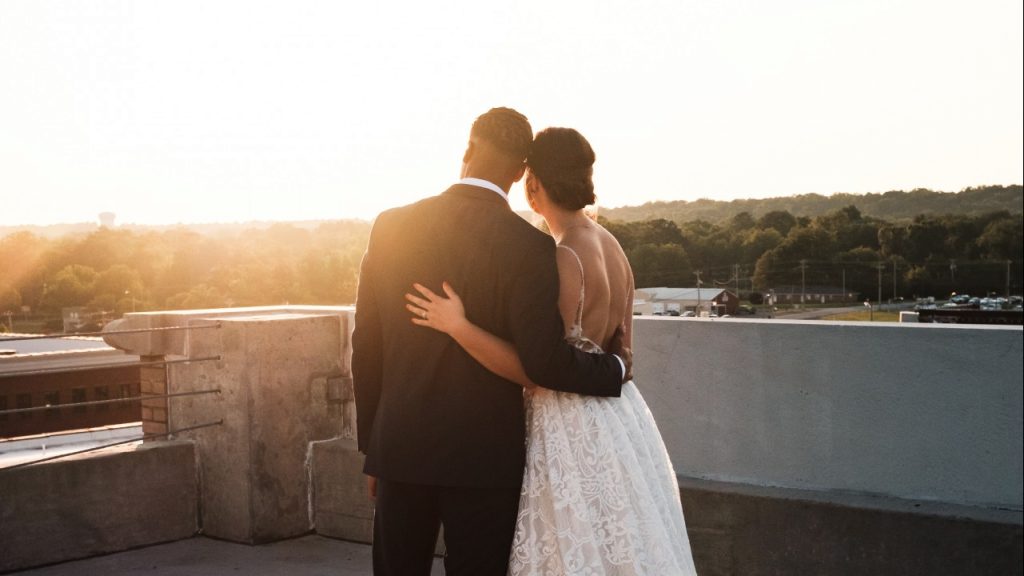I rejected the stereotypes.
The eccentric bachelor. The inflexible spinster. The selfish, longtime single — now a caricature of all his or her own worst traits. No, I thought. If I embrace the growth opportunities God is sure to send me, I’m not doomed to be that way.
But just after my 40th birthday, I considered marriage to a longtime friend. In a nine-month conversation spanning 1,300 miles, my affection grew. My hope grew. But my willingness to move and change did not.
“Psalm 45!” a young woman exhorted me. “Leave your father’s house. Dive in to this relationship. He’s a great man, great family!”
But it wasn’t so simple — not even when the marriage I longed for seemed to be within my grasp.
In that season of indecision, I felt my singleness as a gift: For the first time, I have my own little home. Five young women whom I mentor are “my girls.” Because I live nearby, my tiny niece and nephew have become dear friends. And I’m free to live the callings I’ve spent two decades discerning and developing.
I had lot to lose.
When my friend and I broke up for solid reasons, the fear crept in: Am I too selfish? Too stubborn? After all these years of hoping for marriage, is it too late for me to change?
The Challenges
Scrambling to regain perspective, I reached out to my peers. After hearing from 24 people in three countries – 12 married and 12 single – I can assure you: It’s not my imagination. Considering marriage past 30 is hard.
For me, there was the weariness of serial disappointments. And when my age and my longing for children had to be factored in, I felt intensely vulnerable.
If you’re single past 30, you may have lost the sense of endless possibilities you had in your 20s, or the comfortable assumption that love and marriage just happen to everyone.
You may be mourning your dreams of family size, young parenthood, or the luxury of waiting a few years for kids. Perhaps your waning fertility (as a woman) or ability to attract a young wife (as a man) gives painful urgency to every potential relationship. If you’re a single parent, you may wonder who will accept you; if you’re not a single parent, you may fear marrying one. By now, you have peers with troubled or broken marriages. Your own past sins, mistakes or disappointments may complicate your responses in relationships.
Keith mourned that the giddy, on-top-of-the-world experience of falling in love in his 20s was not repeated when he pursued his wife at 31. For him, love after heartbreak “was more decision than happenstance, more a journey than a moment, and it was substantiated by what I was doing rather than how I was feeling.”
Danielle has been shaped by the years when most of the world around her was found marriageable – and she was not. “It is possible,” she says, “to feel deeply the sting of rejection without having been overtly rejected.” And when friends suggest introducing her to someone, this experience affects how she responds.
Danielle is also “painfully aware that the very independence and self-reliance I’ve had to cultivate in order to live well in extended singleness could also make it much more difficult to adjust to marriage, should that ever occur.”
On the path to marriage after 30, my friends have faced the loss of long-held spontaneity and autonomy: freedom to arrange their homes, to be awake early or late, to travel, rest or spend, to serve, give, or have quiet time with God without affecting or consulting a spouse.
In seeking a match, they have had to take into consideration fully formed theologies and convictions. Even minor habits and quirks, routines and priorities — which so far had gone unchallenged — could be part of the cost. And they found it very difficult to prioritize differently or move away altogether from callings, careers, churches, ministries, locations and friendships in which they had long and deeply invested.
The Confidence
Despite all of these challenges, several of my friends see pursuing marriage after 30 as less complicated than before. And most, if not all, saw some real benefits. While dating, they reported more open communication, less need to impress, and fewer guessing games. Some have gained greater boldness to try new methods of meeting someone. Most are now attracted to more substantive traits in a potential spouse.
They’ve gained more understanding of themselves and their non-negotiables, more experience with God’s guidance and their own intuition, and more discernment of the difference between infatuation and a good fit. As a result, they are making decisions for, against, and about marriage with dignity and confidence.
For Keith, love in his 30s looked like new willingness to be vulnerable, a deep and settled care for his future wife, and a commitment to her and their relationship, no matter what. It grew with the frequent, steady counsel of a mature, unbiased older friend.
Charles says that when he saw Rebekah genuinely helping with his projects and challenging him toward godliness without tearing him down or conveying disrespect, “I knew this was the first real woman I had met who was a serious choice for marriage.”
Rebekah watched mini-confirmations build up, until “I finally realized that the only thing keeping me from saying ‘yes’ to moving forward with Charles was fear. Without giving me that clear, specific answer I wanted, God moved me to step forward in faith and trust Him with the outcome.”
Meanwhile, Rachel is wired to daydream about the ways singleness can express “undivided devotion to God and active, involved, communal love for his people.” Only after time and deliberately considering “the costs of marriage in an honoring but honest way” did her daydreams crystallize into personal vocation. She embraced singleness.
Online I found the story of Nancy Leigh DeMoss, who from childhood had a strong, unmistakable sense that she was set apart for God’s kingdom purposes. Having hit her stride with an international Bible ministry to women, she faced a huge shift in her lifestyle and thinking when Robert Wolgemuth invited her into a relationship. It was only after seeking Pastor John Piper’s counsel that Nancy felt free to embrace singleness or marriage: “the one you choose in love for God.”
Over time, she became convinced that she was to marry this man. Though Robert told her, “You must continue serving the Lord in the ways He’s gifted you,” she kept wondering how she’d balance ministry and marriage. That’s when her counselor challenged her, as a woman who had taken many steps of faith, to say yes to God’s call here too – and watch how He would provide a way.
Joyfully, Nancy married for the first time at 57.
The Hope
What could marriage look like for us in our 30s, 40s and beyond?
Maureen describes marriage as learning to exist in close orbit: not expecting the impossible from yourself or your spouse (giving up the essential parts of your respective selves), but learning where the fixed boundaries are and where there is room for growth.
Just married in their mid-30s, Mark and Lauren talked through their new living room detail by detail, wedding her colorful maximalism with his utilitarian minimalism, and creating a beautiful space that garnered compliments. Six months later, the truth came out in conversation: The space meant to help them relax together made them jointly miserable. It felt stressful to Mark, while Lauren still found it sterile.
But they didn’t give up, and over time, “large family dinners, hang-outs with friends and cuddly evenings watching Netflix together made for happy memories that psychologically warmed up the space. It became our space together – the best of both of us.”
When Keith started dating Kira, he had deeply invested in a job that was his mission field. Kira was enthusiastic about joining him there, but prior to marriage – without seeing the exact way forward – he came agonizingly to the point of surrender that if the two were to conflict someday, “it was my wife who remained in my life, not my job.”
Keith says, “As mature as we were, and as well as we knew ourselves, we knew to have really hard conversations.” So while dating was harder for him than for his 20-something friends, his first year of marriage was easier. And his long experience of singleness still gives him a “continual and incredible sense of gratitude.”
Now five years into marriage, Keith says, “We have been fused together in such a way that I could leave what I do in a heartbeat if it meant she and I could more effectively realize God’s calling on our lives. It took time, but my marriage is now truly on the ‘ground level’ so to speak, with vocation an outworking of that.”
The How
According to my friends, the challenges of marriage are similar at any age. They only seem greater when we’re older because as we mature, we view them more realistically. We know more fully what we’re giving up. We’ve also gotten real about ourselves.
Perhaps as singles past 30 we fear the stereotypes because we understand that relationships activate all sorts of sin issues in our hearts, providing potential for us to grow. But by no means is marriage the only way God sanctifies us.
TJ, a bachelor, is confident that as Christ spiritually matures him over time, he’ll be increasingly prepared to sacrifice for his future wife. Joy sees each of her dating relationships, whatever their outcome, as God’s means of growing her into the image of Christ.
If the stereotypically selfish single has stiff-armed God’s maturing work, then how do we embrace it? As singles past 30, how do we position ourselves for unselfishness and unity? Here are a few ideas:
- Expect that any human interaction could be God’s tool for shaping you. Pursue opportunities to practice skills like repenting, engaging in healthy conflict, and articulating what’s in your heart.
- If you don’t debrief your romantic life with someone, start now. Steadily pursue counsel, but only from the wise.
- If you’ve accumulated expectations for how dating will play out, the feelings you’ll have, and what your spouse will be like, make room for God to surprise you.
Kingdom Life
While preparing for a date, I scrolled to Philippians 2 and caught the glint of an unexpected opportunity: You don’t have to become clones to be in close relationship. Mutually choose the mindset Jesus had when He emptied Himself for us. (Philippians 2:1-8)
Whether sweeping sacrifice or incremental, whether the welcome loss of self-life or baby steps towards unity – for single or married, surrender is the norm for the Christian life.
Here’s where my fear that I’m too selfish is accurate. As a single woman, I am rich. I have a lot to lose. Despite my deep desire for marriage, I can’t make the leap on my own.
Remember the rich young ruler? His wealth became so much baggage because he could not lay it down, even to enter the kingdom.
“With man it is impossible,” said Jesus, “but…all things are possible with God.” (Mark 10:27)
Considering marriage at 40 was my wake-up call.
It brought me to my knees to ask what God saw in my heart. It brought me back to practicing the basics of Jesus’ call to me. It intensified my experience of the beauty, fruitfulness and dignity inherent in my single life when it’s a life filled with purpose.
I learned that it’s surrender, not selfishness, to release a potential spouse who cannot accept my core values and callings, the essentials God has hard-wired into my walk with Him.
And from my friends I learned to reject fatalism, give God credit for the ways He has already rescued me from selfishness, and embrace the advantages of pursuing marriage at my age.
Since I have something to lose, I have a lot to give.
Copyright 2019 Elisabeth Adams. All rights reserved.











